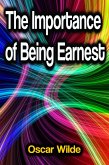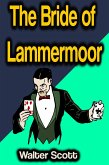George Eliot
The Mill on the Floss (eBook, ePUB)
4,99 €
4,99 €
inkl. MwSt.
Sofort per Download lieferbar

0 °P sammeln
4,99 €
Als Download kaufen

4,99 €
inkl. MwSt.
Sofort per Download lieferbar

0 °P sammeln
Jetzt verschenken
Alle Infos zum eBook verschenken
4,99 €
inkl. MwSt.
Sofort per Download lieferbar
Alle Infos zum eBook verschenken

0 °P sammeln
George Eliot
The Mill on the Floss (eBook, ePUB)
- Format: ePub
- Merkliste
- Auf die Merkliste
- Bewerten Bewerten
- Teilen
- Produkt teilen
- Produkterinnerung
- Produkterinnerung

Bitte loggen Sie sich zunächst in Ihr Kundenkonto ein oder registrieren Sie sich bei
bücher.de, um das eBook-Abo tolino select nutzen zu können.
Hier können Sie sich einloggen
Hier können Sie sich einloggen
Sie sind bereits eingeloggt. Klicken Sie auf 2. tolino select Abo, um fortzufahren.

Bitte loggen Sie sich zunächst in Ihr Kundenkonto ein oder registrieren Sie sich bei bücher.de, um das eBook-Abo tolino select nutzen zu können.
The Mill on the Floss George Eliot - The Mill on the Floss is a novel by George Eliot, first published in three volumes in 1860 by William Blackwood. The first American edition was published by Harper & Brothers, Publishers, New York
- Geräte: eReader
- ohne Kopierschutz
- eBook Hilfe
- Größe: 1.02MB
- FamilySharing(5)
Andere Kunden interessierten sich auch für
![Children of the Mill (eBook, ePUB) Children of the Mill (eBook, ePUB)]() David HansonChildren of the Mill (eBook, ePUB)3,99 €
David HansonChildren of the Mill (eBook, ePUB)3,99 €![The Lone Star Ranger (eBook, ePUB) The Lone Star Ranger (eBook, ePUB)]() Zane GreyThe Lone Star Ranger (eBook, ePUB)3,99 €
Zane GreyThe Lone Star Ranger (eBook, ePUB)3,99 €![The Parasite (eBook, ePUB) The Parasite (eBook, ePUB)]() Arthur Conan DoyleThe Parasite (eBook, ePUB)2,99 €
Arthur Conan DoyleThe Parasite (eBook, ePUB)2,99 €![The Importance of Being Earnest (eBook, ePUB) The Importance of Being Earnest (eBook, ePUB)]() Oscar WildeThe Importance of Being Earnest (eBook, ePUB)3,99 €
Oscar WildeThe Importance of Being Earnest (eBook, ePUB)3,99 €![The Black Moth A Romance of the XVIIIth Century (eBook, ePUB) The Black Moth A Romance of the XVIIIth Century (eBook, ePUB)]() Georgette HeyerThe Black Moth A Romance of the XVIIIth Century (eBook, ePUB)4,99 €
Georgette HeyerThe Black Moth A Romance of the XVIIIth Century (eBook, ePUB)4,99 €![The Bride of Lammermoor (eBook, ePUB) The Bride of Lammermoor (eBook, ePUB)]() Walter ScottThe Bride of Lammermoor (eBook, ePUB)4,49 €
Walter ScottThe Bride of Lammermoor (eBook, ePUB)4,49 €![Roderick Hudson (eBook, ePUB) Roderick Hudson (eBook, ePUB)]() Henry JamesRoderick Hudson (eBook, ePUB)4,99 €
Henry JamesRoderick Hudson (eBook, ePUB)4,99 €-
-
-
The Mill on the Floss George Eliot - The Mill on the Floss is a novel by George Eliot, first published in three volumes in 1860 by William Blackwood. The first American edition was published by Harper & Brothers, Publishers, New York
Dieser Download kann aus rechtlichen Gründen nur mit Rechnungsadresse in A, B, BG, CY, CZ, D, DK, EW, E, FIN, F, GR, H, IRL, I, LT, L, LR, M, NL, PL, P, R, S, SLO, SK ausgeliefert werden.
Produktdetails
- Produktdetails
- Verlag: Phoemixx Classics Ebooks
- Seitenzahl: 888
- Altersempfehlung: ab 13 Jahre
- Erscheinungstermin: 28. September 2021
- Englisch
- ISBN-13: 9783986479671
- Artikelnr.: 62599124
- Verlag: Phoemixx Classics Ebooks
- Seitenzahl: 888
- Altersempfehlung: ab 13 Jahre
- Erscheinungstermin: 28. September 2021
- Englisch
- ISBN-13: 9783986479671
- Artikelnr.: 62599124
- Herstellerkennzeichnung Die Herstellerinformationen sind derzeit nicht verfügbar.
Mary Ann Evans, known by her pen name George Eliot, was an English novelist, poet, journalist, translator and one of the leading writers of the Victorian era. She was born in 1819 at a farmstead in Nuneaton, Warwickshire, England, where her father was estate manager. Mary Ann, the youngest child and a favorite of her father's, received a good education for a young woman of her day. Influenced by a favorite governess, she became a religious evangelical as an adolescent.Her first published work was a religious poem. Through a family friend, she was exposed to Charles Hennell's "An Inquiry into the Origins of Christianity". Unable to believe, she conscientiously gave up religion and stopped attending church. Her father shunned her, sending the broken-hearted young dependent to live with a sister until she promised to reexamine her feelings. Her intellectual views did not, however, change. She translated "Das Leben Jesu", a monumental task, without signing her name to the 1846 work.After her father's death in 1849, Mary Ann traveled, then accepted an unpaid position with The Westminster Review. Despite a heavy workload, she translated "The Essence of Christianity", the only book ever published under her real name. That year, the shy, respectable writer scandalized British society by sending notices to friends announcing she had entered a free "union" with George Henry Lewes, editor of The Leader, who was unable to divorce his first wife. They lived harmoniously together for the next 24 years, but suffered social ostracism and financial hardship. She became salaried and began writing essays and reviews for The Westminster Review.Renaming herself "Marian" in private life and adopting the penname "George Eliot," she began her impressive fiction career, including: "Adam Bede" (1859), "The Mill on the Floss" (1860), "Silas Marner" (1861), "Romola" (1863), and "Middlemarch" (1871). Themes included her humanist vision and strong heroines. Her poem, "O May I Join the Choir Invisible" expressed her views about non supernatural immortality: "O may I join the choir invisible/ Of those immortal dead who live again/ In minds made better by their presence.







